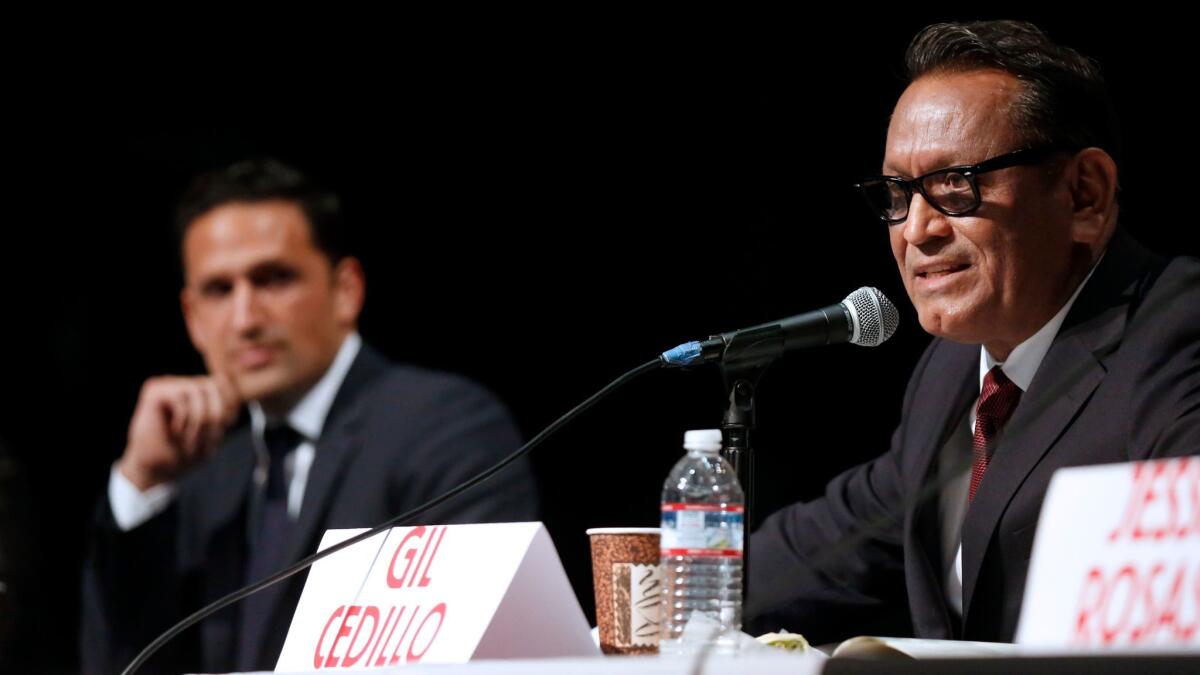It’s hard to beat an incumbent — just look at L.A.’s City Council races

- Share via
Incumbency and the political establishment once again reigned supreme in Los Angeles’ City Council contests.
Six sitting councilmen eclipsed their rivals by margins as high as 54 points. A seventh — the most vulnerable — appeared to narrowly avoid a runoff, pending the count of some outstanding ballots.
And in the race for the sole open council seat, in a swath of the San Fernando Valley that is hostile to City Hall because of pent-up feelings of neglect, the two candidates who made it into the runoff are city insiders.
“This is a pretty good day for the political establishment in Los Angeles, and probably unexpectedly so,” said Raphael J. Sonenshein, executive director of the Edmund G. “Pat” Brown Institute for Public Affairs at Cal State L.A.
Sonenshein said the presence on the ballot of Measure S — designed to crack down on larger developments — could have stirred the races. But the “populist revolt” many expected to come out in support of the measure never materialized and it lost badly, Sonenshein said.
“Measure S had the potential to not just upset development policy in the city but put incumbents at risk. It didn’t play out that way even though it was extremely well funded,” he added. “City Hall kind of dodged a bullet.”
Unseating a City Council incumbent is a tall order. Officeholders tend to have large financial advantages, the backing of key groups, such as labor, and the endorsements of prominent elected leaders, such as Mayor Eric Garcetti. The last time an incumbent was voted out was in 2003, and it took a prominent former Assembly speaker — Antonio Villaraigosa — to do it.
Councilman Gil Cedillo was the most vulnerable incumbent in Tuesday’s election, facing an unusually strong challenge from bike activist Joe Bray-Ali.
At the incumbent’s election night party at the Ebell Club in Highland Park, every updated round of vote tallies showed Cedillo losing ground in the 1st Council District. The bar had run dry, the food had all been eaten, the music stopped and Cedillo was huddling behind closed doors with advisors. Most of his supporters had left thinking he was probably headed into a runoff.
Shortly after midnight, the county registrar-recorder’s website posted updated results showing that Cedillo had received 50.98% of the vote, with 100% of the precincts reporting — avoiding a runoff by just 129 votes.
The remaining supporters stormed the private room, circled Cedillo, started chanting “Si se puede! Si se puede!” and stomped on the wooden floors.
“We took advantage of our advantages — experience matters — and we had faith,” Cedillo said.
The county registrar announced Wednesday afternoon that about 294,900 ballots — largely provisional and late mail ballots — still needed to be counted, as well as an unknown number of mail ballots that have been postmarked by Tuesday that the office receives by Friday. It’s unknown how many of these ballots are from Cedillo’s district. An update is scheduled for Friday.
Paul Mitchell, a voter data expert who has no stake in the race, said the uncounted ballots could force a runoff.
“It’s going to be one we have to watch for the next three or four days as they count ballots,” he said. “It will be a nail-biter.”
Cedillo’s campaign pointed to its Tuesday night vote total as a reason for optimism.
“There are still a lot of votes left to be counted, but we feel good about how we performed with both vote-by-mail and election day voters,” said Derek Humphrey, an advisor to Cedillo’s campaign.
Bray-Ali countered that he was confident he and Cedillo would compete through the May election.
“As far as this campaign is concerned, the runoff election started yesterday,” he said. “We continue to build coalitions for change and will make certain the votes are counted accurately and fairly.”
Councilman Paul Koretz, the incumbent in the 5th Council District, was thought to be in jeopardy of a runoff because of a well-funded rival. He conceded that he “had some concerns” Tuesday night, before the results came in and he ended up winning 66% of the vote.
The other incumbent councilmen on the ballot had similarly large victories — Mitch O’Farrell with 60%, Curren Price with 63%, Mike Bonin with 70%, and Joe Buscaino with 74%. Councilman Bob Blumenfield was unopposed.
The lone open seat was in the 7th Council District, which covers part of the San Fernando Valley.
The area’s elected councilman, Felipe Fuentes, resigned in September to become a lobbyist. Since then, City Council President Herb Wesson has represented the district.
Twenty candidates vied for the seat, all but guaranteeing that no one would gain a majority in the primary and win the seat outright. But the two candidates headed for the May 16 runoff are not outsiders railing against the system; rather, Monica Rodriguez and Karo Torossian are very much part of it.
Rodriguez served on the city’s Board of Public Works and was endorsed by Garcetti. Torossian worked for Councilman Paul Krekorian as a policy advisor. Both received large campaign contributions and key endorsements.
Bill Burton, a Democratic strategist who did not work on this race, said it’s not surprising that the candidates with the traditional campaigns rose to the top.
“The establishment is in power for a lot of reasons because often they know how to run races and put together good campaigns,” Burton said. “In that area, the change candidates didn’t run very compelling campaigns. I think this is a moment where outsiders can be very well positioned, but you’ve got to do the work.”
Twitter: @LATSeema
More to Read
Sign up for Essential California
The most important California stories and recommendations in your inbox every morning.
You may occasionally receive promotional content from the Los Angeles Times.











